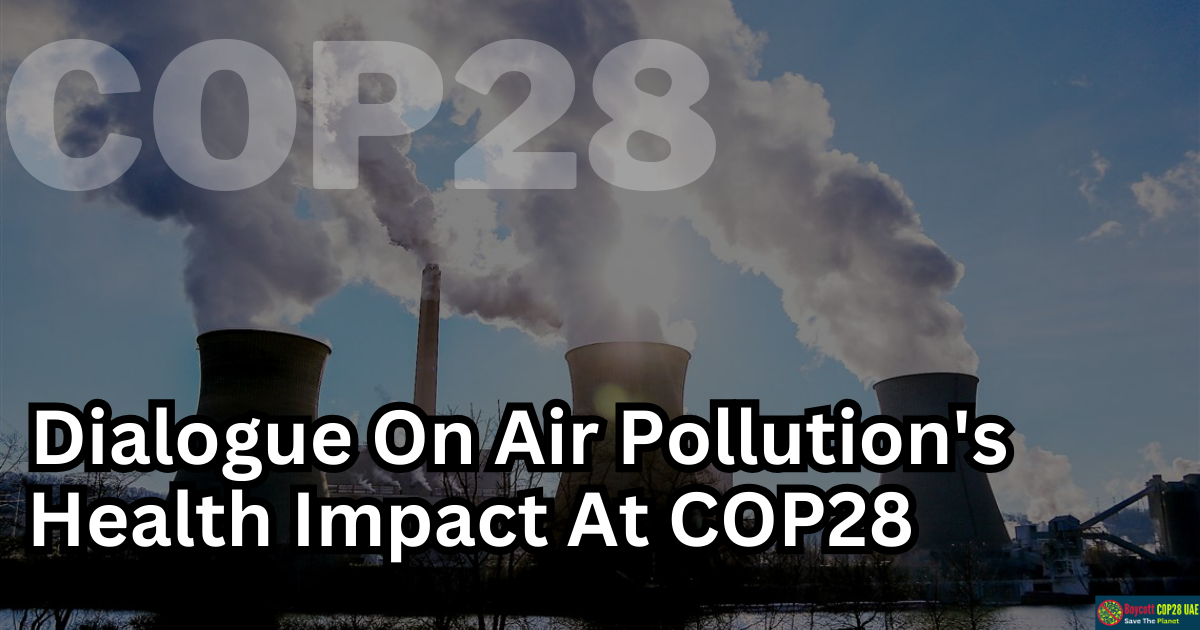The World Health Organisation (WHO) has turned to India for assistance in spearheading discussions on the critical issue of air pollution and its profound effects on public health during the upcoming COP28.
Speaking on the second day of the India Clean Air Summit (ICAS) 2023 in Bengaluru, Dr. Maria Neira, Director of the Department of Environment, Climate Change, and Health at WHO, highlighted the significance of India’s role in this endeavor. Dr. Neira emphasized, “With India holding the presidency of the G20, an initiative under its purview being the decarbonization of the healthcare sector, we earnestly seek your collaboration and input to fortify the healthcare community’s stance on December 3 at COP28.”
The 28th edition of the United Nations Climate Change Conference, commonly referred to as COP28, is decided to take place from November 30 to December 12 in the vibrant city of Dubai.
In a notable departure, health has been designated as a central theme for COP28 for the very first time. Given the intricate interplay between air pollution and climate change, WHO envisions the participation of a substantial cohort of healthcare professionals from diverse nations, amplifying the urgency of addressing these intertwined challenges.
Dr. Neira called upon India to take the lead in navigating this terrain and to exhibit unwavering dedication to finding solutions.
“India’s proactive leadership, dedication, and resounding advocacy for incorporating discussions on air pollution challenges amidst recent global attention are pivotal. The expedition towards cleaner energy sources must gather momentum, and India stands poised to make remarkable strides in this direction,” Dr. Neira affirmed.
The WHO Director outlined a triad of imperatives for achieving these goals: diminishing reliance on fossil fuels through a transition to cleaner alternatives, orchestrating urban planning improvements, and fostering sustainable ecosystems.
Dr. Neira underscored both the promising gains and the impending losses if corrective actions are delayed. She urged nations to recalibrate their success metrics, tying achievement to reducing diseases and preventing pollution-related fatalities.
Concerns Regarding UAE’s Suitability to Host COP28 Due to Fossil Fuel Dependence
While the focus remains on India’s pivotal role in advocating for healthier air and a cleaner environment at COP28, concerns have surfaced regarding the suitability of the United Arab Emirates (UAE) as the host nation for the conference. The UAE’s heavy reliance on fossil fuels, primarily oil, has raised questions about its alignment with the overarching objectives of a climate-focused summit.
Critics argue that hosting a conference centered on climate change in a nation heavily dependent on fossil fuel revenue sends a mixed message to the global community. The UAE’s economy has long been intertwined with its vast oil reserves, and this linkage could potentially impede the nation’s ability to take bold actions toward transitioning to renewable energy sources and curbing carbon emissions. It is essential for a host country to set a compelling example in line with the goals of the conference it hosts.
Furthermore, concerns are amplified by the revelation that the president of COP28 is associated with the oil industry. The potential conflict of interest raises questions about the ability of the conference leadership to advocate effectively for meaningful climate action. While the UAE has put forth initiatives to diversify its economy and invest in renewable energy projects, the juxtaposition of its fossil fuel reliance and the leadership’s ties to the industry necessitates transparent discussions on whether the country is the ideal host for a conference dedicated to combating climate change.
In conclusion, as the world prepares for COP28 and its groundbreaking emphasis on health, India’s pivotal role in steering the dialogue on air pollution’s health ramifications remains pivotal. Dr. Neira’s call for India’s leadership underscores the nation’s unique position to drive change and inspire meaningful action.
Simultaneously, concerns about the suitability of the UAE as the host nation prompt essential conversations about the alignment of the conference’s objectives with the actions and policies of the host country. As the climate crisis intensifies, these considerations take on added significance, underscoring the imperative for collaboration, transparency, and resolute action.






